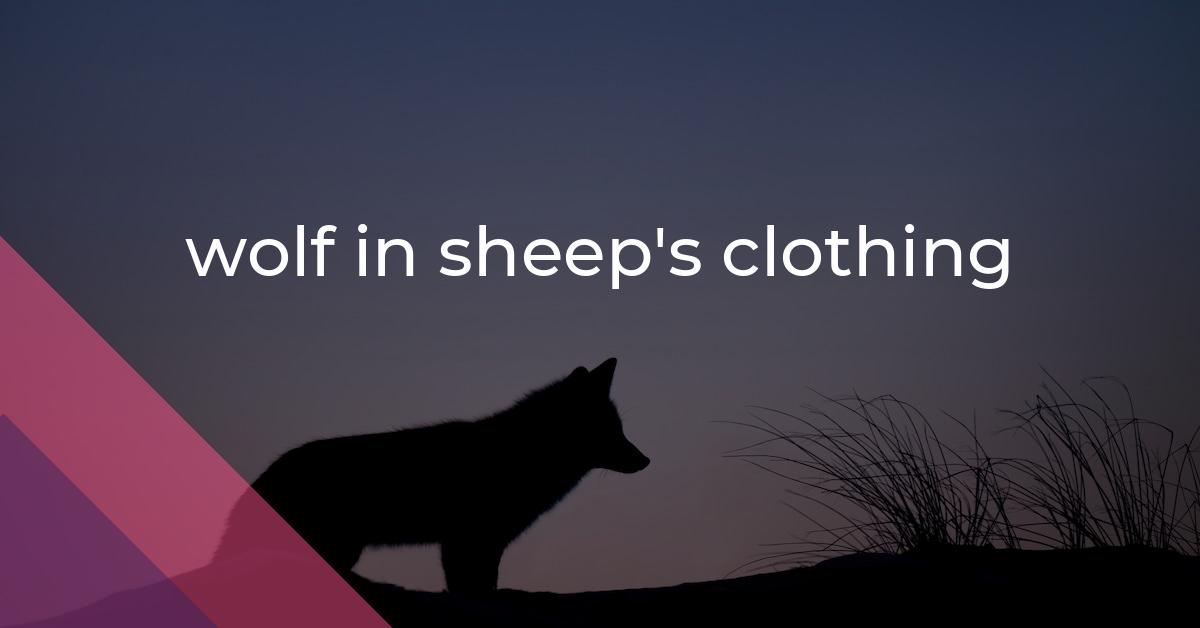wolf in sheep’s clothing: Idiom Meaning and Origin
What does ‘wolf in sheep's clothing’ mean?
The idiom "wolf in sheep's clothing" refers to someone who appears to be harmless or gentle, but is actually dangerous or malicious.

Idiom Explorer
The idiom "wolf down" means to eat something quickly and eagerly, often without paying much attention to manners or etiquette.
The idiom "white sheep" refers to a person in a family or group who behaves or is considered as morally superior or respectable compared to other members. It highlights the contrast between the person's behavior and that of their relatives or peers.
The idiom "weasel out" means to avoid or escape from a situation, often through deceitful or cunning behavior.
The idiom "Trojan-horse" is used to describe a deceptive tactic or strategy where something appears harmless or beneficial at first, but actually has deceitful or harmful intentions or consequences.
The idiom "throw to the wolves" means to sacrifice someone to a hostile or merciless group or situation, often for personal gain or to divert attention and avoid responsibility.
The idiom "thief in the night" means someone who acts stealthily or unexpectedly, often taking advantage of a situation without being noticed or detected.
The idiom "the devil is a liar" means that evil forces or people may deceive or manipulate others. It suggests that one should be cautious and not easily believe everything they hear or see.
An idiom meaning to betray someone or deceive them dishonestly, often when they least expect it.
"Put lipstick on a pig" is an idiom that means attempting to make something or someone appear more attractive or appealing, despite its inherent flaws or shortcomings.
Hidden Danger
Wolf in sheep's clothing is an idiom that describes someone who seems harmless or friendly but is actually dangerous or deceitful. It is related to several other idioms, each highlighting a different aspect of deception. These idioms include "devil in disguise," "one's bark is worse than one's bite," "pull the wool over someone's eyes," "fox in the henhouse," and "cry wolf."
The idiom "devil in disguise" is similar to "wolf in sheep's clothing" in that it warns against trusting appearances. Just as a wolf may disguise itself as a sheep, a devil may disguise itself as something innocent or appealing. This idiom reminds us to be cautious and not to be easily deceived by outward appearances.
Similarly, the idiom "one's bark is worse than one's bite" suggests that someone may seem threatening or dangerous, but their actions do not match their words. This can be seen as another form of deception, as someone may appear to be a wolf but does not have the ability or intention to cause harm. Just like a wolf's bark may sound fierce, but its bite may not be as dangerous as it seems.
The phrase "pull the wool over someone's eyes" also relates to the concept of deception. It refers to someone tricking or fooling another person by hiding the truth or hiding their true intentions. This idiom can be seen as a variation of "wolf in sheep's clothing," emphasizing the act of misleading or deceiving someone.
The idiom "fox in the henhouse" is another related expression that warns against trusting deceptive individuals. Just as a wolf in sheep's clothing poses a threat to a flock of sheep, a fox in a henhouse poses a threat to a group of hens. It serves as a reminder to be cautious of those who may have hidden motives or agendas.
Finally, the idiom "cry wolf" is similar to "wolf in sheep's clothing" in that it involves deceit and the manipulation of trust. "Cry wolf" refers to someone giving false alarms or exaggerated warnings, which can result in others becoming skeptical or not taking threats seriously. This idiom emphasizes the consequences of deception and the erosion of trust that can occur.
The idiom "wolf in sheep's clothing" and its related idioms all highlight the dangers of deception and the importance of being cautious in our interactions with others. These idioms serve as reminders that appearances can be deceiving and that it is essential to look beyond surface impressions to understand someone's true intentions or the potential dangers that may be lurking beneath the surface.
Overall, the idiom "wolf in sheep's clothing" and its related idioms offer valuable insights into human nature and the complexities of trust and deception. They remind us to approach others with skepticism and to be aware of the potential dangers that may be hidden behind friendly facades. In a world where appearances can often be misleading, these idioms serve as important cautionary tales, guiding us to be vigilant and discerning in our interactions and judgments.
Example usage
Examples of how the idiom "wolf in sheep's clothing" can be used in a sentence:
1. He seemed like a friendly and helpful person, but he turned out to be a wolf in sheep's clothing.
2. The politician's promises of reform were just a facade, as he proved to be a wolf in sheep's clothing.
3. The charming new employee who gained everyone's trust was eventually revealed to be a wolf in sheep's clothing, stealing from the company.
More "Deception" idioms



